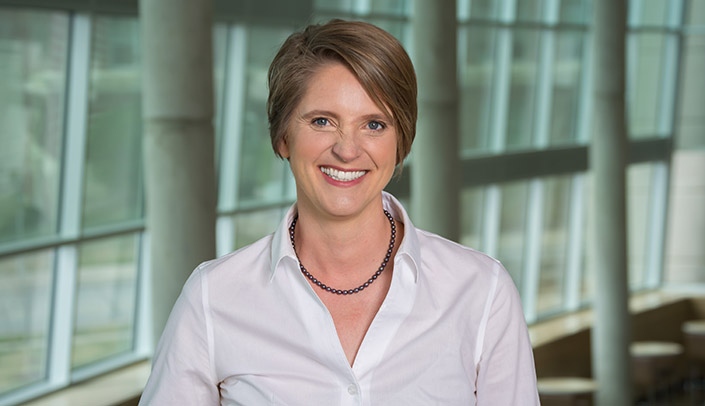Abbie Raikes, PhD, and her research team at UNMC recently were awarded $430,000 in funding from five foundations to conduct the first U.S.-based validation of a new scale of early child development.
The Global Scales of Early Development (GSED) were developed in partnership with the World Health Organization (WHO) and a global team of scientists. It measures early child development for children from birth through age three.
The GSED measures simple developmental milestones based on a child’s age including:
- Does your child smile at you?
- Can your child walk on uneven surfaces without falling?
- Can your child say 10 or more words in addition to “Mama” and “Dada?”
- Can your child count up to five objects?
Nebraska’s project will contribute to national efforts to generate data on young children’s development. Dr. Raikes, an associate professor of health promotion in the UNMC College of Public Health, and her team are collaborating with the Health Resources and Services Administration, an agency of the U.S. Department of Health and Human Services, to add items to the scale for all young children age birth through five years, including items from the National Survey of Children’s Health.
“There are very few ways to check progress in young children at the population level and a scale like this provides insight into important development goals. This is a unique opportunity for Nebraska and will contribute to the exciting work happening in the area of early childhood development across the state and the nation,” Dr. Raikes said.
The global scale will be launched in Nebraska as an online survey that will target families in Lincoln and the Omaha-metropolitan area at first. The overarching goal is for the scale, with the additional items from the National Survey of Children’s Health, to be used across the U.S. to help states and communities assess the developmental well-being of children birth through age five years.
The online survey will be available for caregiver participation until the end of 2020.
Dr. Raikes said she is reaching out to childcare providers, pediatricians and others to get the word out to parents of children age birth through five years.
“Longer validation studies of the Global Scales of Early Development are happening simultaneously in six other countries, including Pakistan, Ivory Coast, Tanzania, Bangladesh, the Netherlands and Brazil,” she said.
Dr. Raikes said she is curious to see if the data she collects in Nebraska matches the statistical curve describing early childhood development found in other countries. Eventually, she said, the WHO would like to examine the feasibility of creating curves that measures cognitive, motor and language development, similar to the birth curve that pediatricians use to measure physical development, such as height and weight.
Dr. Raikes began working with the WHO on the global scale in 2012 while living in Paris and working as a program specialist with the United Nations Education Science and Culture Organization.
“Because so much evidence demonstrates the power of early learning and development for later well-being, the Global Scales of Early Development reflect requests to the United Nations from countries around the world to better track progress of young children’s development. We need good metrics that look across an entire population of young children to ensure we’re doing all we can to invest in their growth and development,” Dr. Raikes said.
To develop the scale, the Bill & Melinda Gates Foundation funded the creation of an enormous data set that shows the developmental pathways of nearly 100,000 children from 22 countries.
“We know that the first three years of life are critical for children, their nutrition, the quality of relationships with caregivers, their home environment, all play a role in their development,” Dr. Raikes said.
Studies have shown how rapidly a child’s brain is growing during this time, she said. Brain growth and language development is fostered, she said, by the stimulations they receive and the words they hear.
Conversely, if a child does not receive adequate stimulation, nutrition and health care or is abused physically or emotionally, the stress affects both the body and the mind, laying the groundwork for chronic health conditions later in life, Dr. Raikes said.
The foundations supporting the project include: Buffett Early Childhood Fund, Imaginable Futures, Overdeck Family Foundation, Pritzker Children’s Initiative, and The Valhalla Charitable Foundation.

What a nice accompishment, Abbie!
This is fantastic. And for the Nebraska/U.S. surveys it would be interesting to ensure the inclusion of diverse cultures and languages with the data pool.
Abbie, strong work and great impact for this state and the families you serve!
Congratulations Abbie! This will be a great contribution for young children and their families!